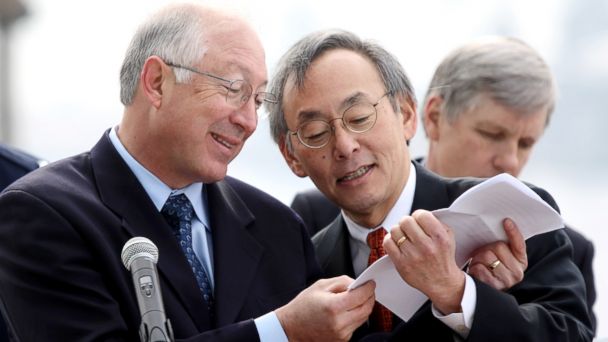Former White House Officials Back Keystone

Interior Secretary Ken Salazar and Energy Secretary Steven Chu look over a map of areas under consideration for wind energy development Feb. 7, 2011. Ross Taylor/The Virginian-Pilot/AP Photo
While President Obama has been publicly vague about his views on the controversial Keystone XL pipeline, several former White House officials are now pushing for the project's approval, going well beyond the administration's official stance.
President Obama and Secretary of State John Kerry haven't openly taken sides on the issue, saying they don't want to get ahead of the decision-making process, which has included research and input from various federal agencies and the public.
But on Wednesday, former Interior Secretary Ken Salazar became the latest White House alumnus to say he supports the pipeline, which would begin in Canada's oil sands and extend to the Gulf of Texas. It's become a hot political topic for environmentalist opponents and business-minded supporters.
Speaking at an energy conference in Houston, Salazar was quoted by FuelFix.com as saying, "At the end of the day, we are going to be consuming that oil. So is it better for us to get the oil from our good neighbor from the north, or to be bringing it from some place in the Middle East?"
Salazar isn't the only White House official to go beyond his boss on the issue.
Last month, President Obama's former national security adviser Tom Donilon said he "probably would" back the project based on energy security concerns, speaking during an Aspen Institute event in Washington.
And Monday, former Energy Secretary Steven Chu appeared to counter the administration's assertion that the Keystone decision, which is in Secretary of State John Kerry's hands, is happening in a political vacuum.
"I don't have a position on whether the Keystone pipeline should be built," Chu said, per the Oil & Gas Journal, deferring to the president and Kerry. "But I will say that the decision on whether the construction should happen was a political one and not a scientific one."
Chu later added that there was a scientific dimension to the pipeline calculus - a recently-released study on its long-term environmental impact - but that "that was the only scientific part of the decision."